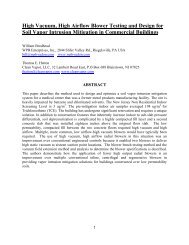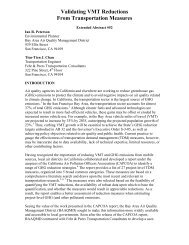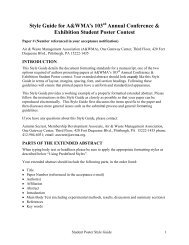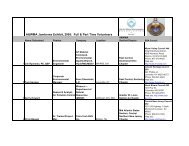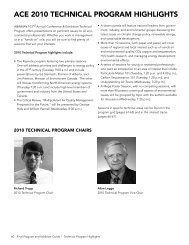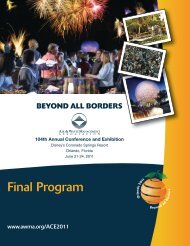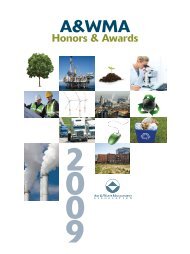Abstract Book
Abstract Book
Abstract Book
You also want an ePaper? Increase the reach of your titles
YUMPU automatically turns print PDFs into web optimized ePapers that Google loves.
In order to reduce vehicle use and emissions, a number of integrated Land Use and<br />
Transportation plans were implemented during the last two decades, such as 1991 Central<br />
Area Plan, the 1995 City Plan, 1997 Transportation Plan, 1999 Bicycle Plan, 2005<br />
Downtown Transportation Plan, 2007 Green Building Strategy, the on-going Metro Core<br />
Job and Economy Studies and the EcoDensity Charters / Directions. The plans focus on<br />
walking/cycling/transit and priority areas such as integrated land use and transit oriented<br />
planning. Development requirements such as public consultations, the Urban Design<br />
Panel, site transport planning and reduced parking requirements all contribute to highly<br />
livable communities that minimize reliance on private autos.<br />
Measures of success include a 60% and 40% walking/cycling/transit mode-share in<br />
Downtown and city-wide, respectively, 60,000 daily cycling trips, 3,500 daily commutercyclist<br />
trips (equivalent to 65-75 full buses), and a 50% increase transit use (1999-2009),<br />
all in the context of growing population and employment.<br />
1B: Sustainable Business Practices<br />
Energy Efficiency Measures at Coast Mountain Bus Company (80)<br />
D. Stewart; Coast Mountain Bus Company, Surrey, BC, Canada<br />
This presentation will review the development and accomplishments of the<br />
environmental program in the bus division of Metro Vancouver’s public transit system.<br />
Coast Mountain Bus Company (CMBC) is an operating subsidiary of the South Coast<br />
British Columbia Transportation Authority (TransLink). CMBC operates a fleet of 3<br />
ferries and 1500 buses and serves a population of over 2.2 million. A brief history of the<br />
efforts to develop and embed an Environmental Management System (EMS) within the<br />
organization will be followed by a short discussion of existing programs such as<br />
environmental training, spill response, and waste management. We will highlight more<br />
recent achievements including a very successful anti-idling campaign, significant GHG<br />
emissions reductions, retrofits to buses to reduce emissions, and an emerging energy<br />
management program. The critical role of Executive support in contributing to the<br />
success of an EMS will also be discussed.<br />
Embedding Sustainability: Framework To Practice - Approaches And Challenges<br />
At Metro Vancouver (206)<br />
J. Carmichael; Metro Vancouver, Vancouver, BC, Canada<br />
Metro Vancouver has taken a strong, active position on addressing sustainability in its<br />
corporate operations, but many challenges remain in operationalizing these approaches.<br />
An overview is given of Metro’s mandates and its corporate sustainability framework,<br />
targets, and drivers, in the context of provincial and federal policy.<br />
Energy and greenhouse gas profiles are discussed, followed by an overview of programs<br />
and projects aimed at energy and greenhouse gas reductions. Energy in British Columbia<br />
has traditionally been thought of as an unlimited, inexpensive resource, so has not been<br />
the focus of analysis or planning at Metro Vancouver. However, in recent years, costs<br />
6




